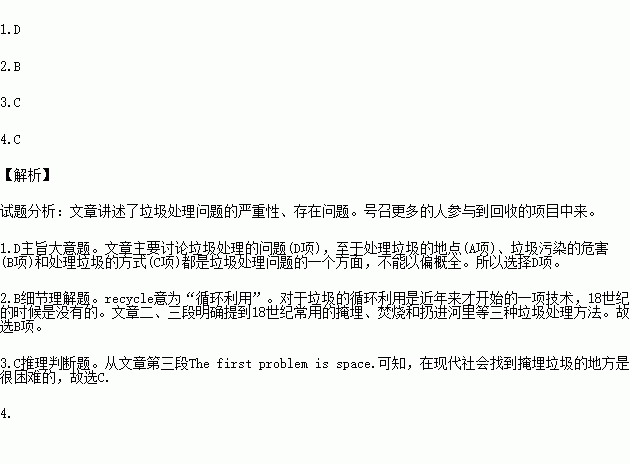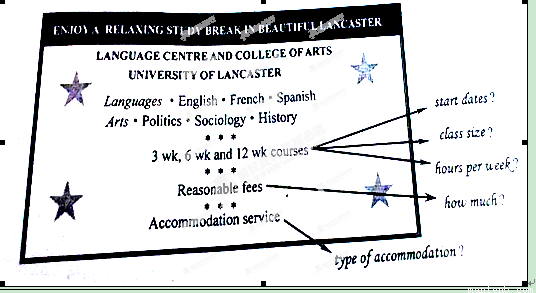题目内容
Disposing (处理) of waste has been a problem since humans started producing it. As more and more people choose to live close together in cities,the waste disposal problem becomes increasingly difficult.
During the eighteenth century,it was usual for several neighboring towns to get together to select a faraway spot as a dump site. People would transport household rubbish,rotted wood and old possessions to the site. Regularly some of the trash was burned and the rest was buried. The unpleasant sights and smells caused no problem because nobody lived close by. Factories and some other industrial sites also had waste to be disposed of. Those located on rivers often just poured the unwanted remains into the water. Others built huge burners with chimneys to deal with the problem.
Several facts make these choices unacceptable to modern society. The first problem is space. Dumps(垃圾场), are most needed in heavily populated areas. Such areas rarely have empty land suitable. Farm areas are refusing to accept rubbish from elsewhere,cheap land in major city areas to dispose wastes is nonexistent(不存在的). Awareness of pollution dangers has resulted in more strict rules of waste disposal. Pollution of rivers,ground water,land and air is a price people can no longer pay to get rid of waste. The amount of waste,however, continues to grow.
Recycling efforts have become commonplace,and many towns require their people to take part. Even the most efficient recycling programs,however,can hope to deal with only about 50 percent of a city's reusable waste,so more people should be involved in recycling programs.
1. The most suitable title for this passage would be .
A. Places for Disposing of Waste
B. Waste Pollution Dangers
C. Ways of Getting Rid of Waste
D. Waste Disposal Problem
2. During the 18th century, people disposed of waste in many ways except for .
A. burying it B. recycling it
C. burning it D. throwing it into rivers
3. What can be inferred(推断)from the third paragraph?
A. Farm areas will continue accepting waste from the city.
B. There is cheap land to bury waste in modern society.
C. It is difficult to find space to bury waste in modern society.
D. Ways to deal with waste in modern society stay the same.
4. The main purpose of writing this article is to .
A. select a suitable dump site
B. warn people of the pollution dangers
C. call on people to take part in recycling programs
D. tell people a better way to get rid of the waste
 53随堂测系列答案
53随堂测系列答案

